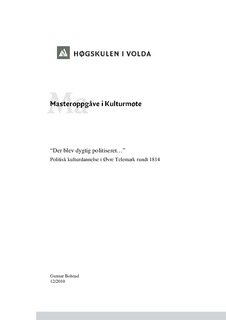"Der blev dygtig politiseret -" : politisk kulturdannelse i Øvre Telemark rundt 1814
Master thesis
Permanent lenke
http://hdl.handle.net/11250/153799Utgivelsesdato
2010Metadata
Vis full innførselSamlinger
- Kulturmøte [51]
Sammendrag
Summary
This essay is about the formative processes that paved the way for the political participation among farmers from the Norwegian county Telemark before and after 1814, when Norway first earned its independence from Denmark with its own constitution and shortly after succumbed to a union with Sweden. The essay focuses on the careers of four different farmers; Talleiv Huvestad, Aasmund Norgaard, Ole Bjørnsen and Ole Blom, who all contributed, each in their own way, to the development of a strong political culture among the farmers. The theoretical perspective is based on theories on social networks, as they are originally expressed by the American sociologist Walter W. Powell, further developed by a group of Swedish historians at the University of Uppsala. The essay is inspired by the on-going research project at the Volda University College on the connection between “the two cultures” of peasant farmers and the local elite. My ambition has been to show how the four agrarian politicians made both allies and enemies with top civil servants and upper class merchants, both locally and nationally. They don’t seem to have been severely restrained by the paternalistic system that characterised the society at the time. A local parish priest, the nationally renowned poet Jens Zetlitz, played an important role as a cultural and political ally of at least two of the four farmers in the essay. While the elite’s mantra was to avoid “politicising”, the farmers’ only option was to do the opposite: Fighting against nobility and in favour of a fair distribution of military service and other societal duties, they had to discard the elite’s established political and cultural norms in order to succeed with their claims. Their activities were not revolutionary, but their engagement contributed to the farmers’ very strong standing in the Parliament only a few decades later.
